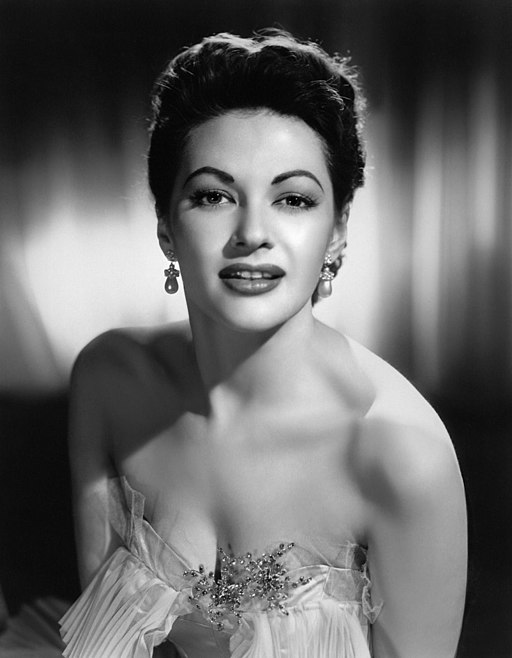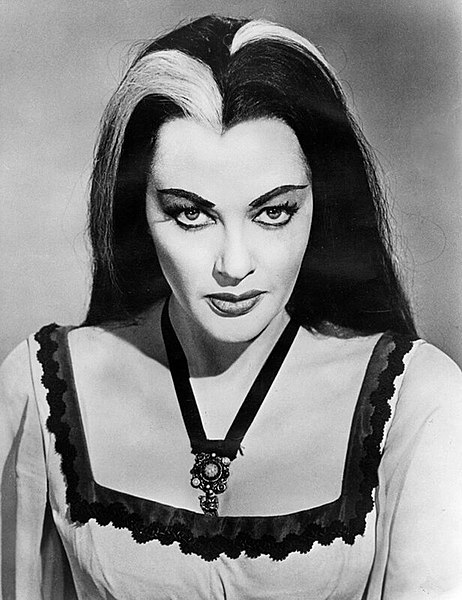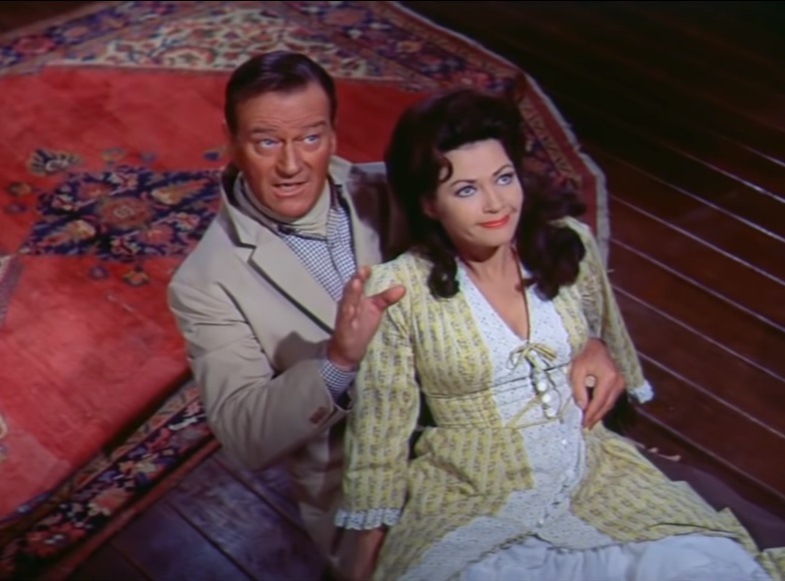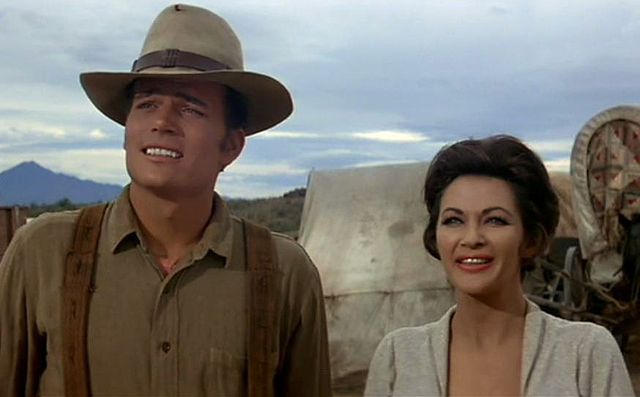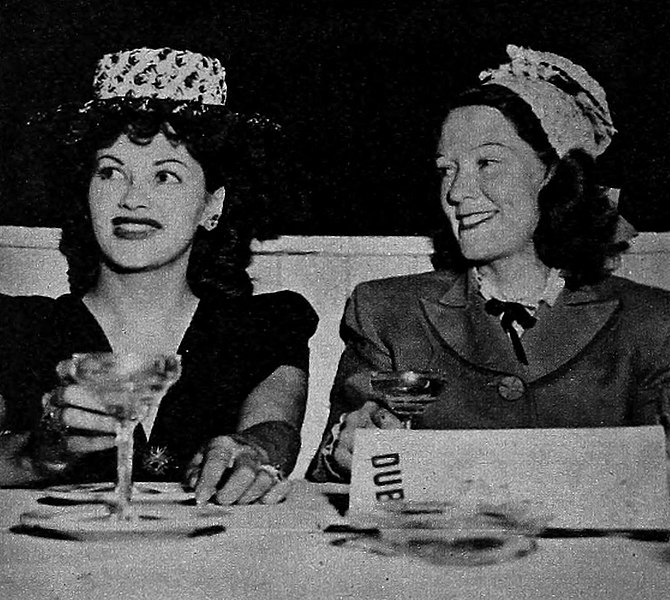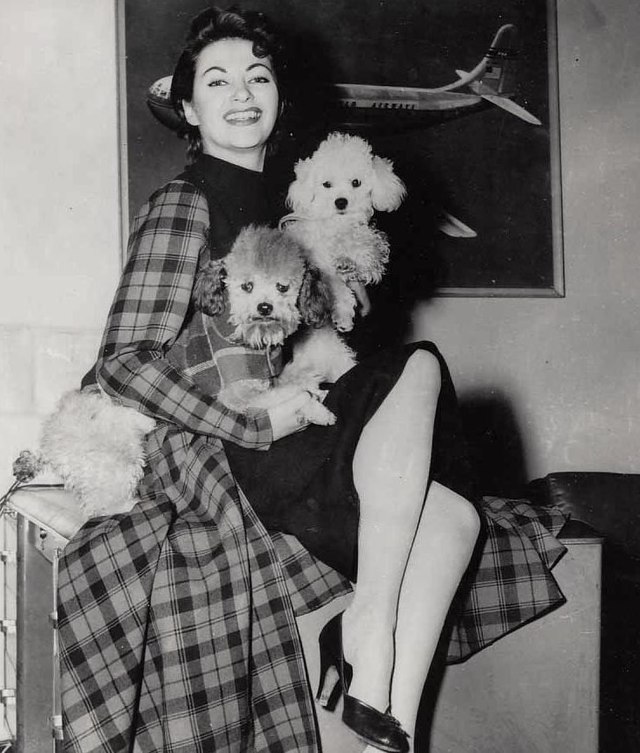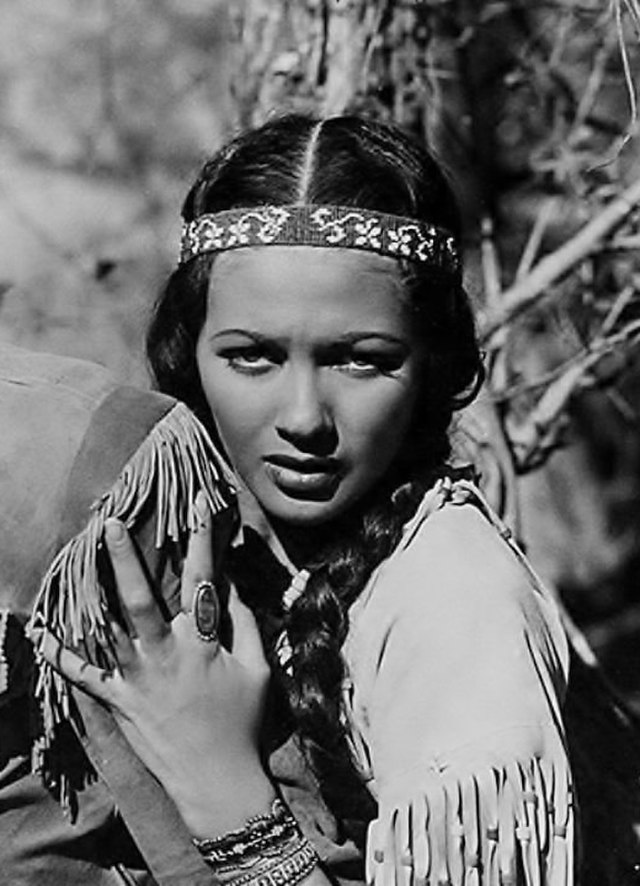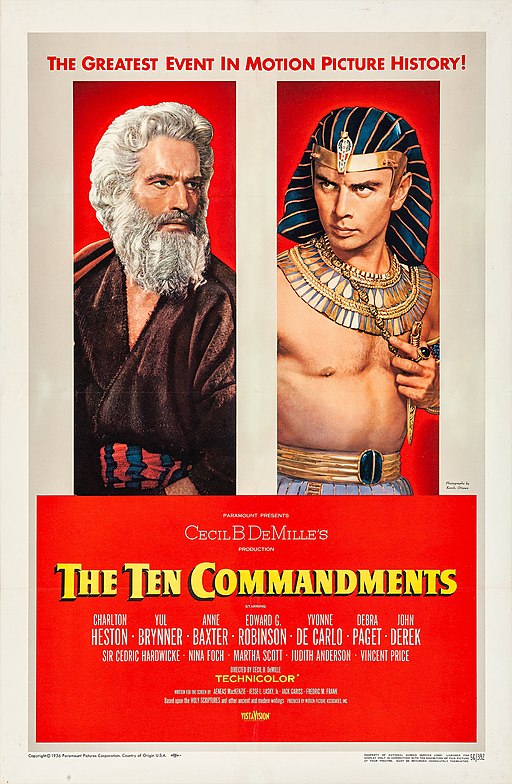Yvonne De Carlo
back| Full Name | Margaret Yvonne Middleton |
| Stage Name | Yvonne De Carlo |
| Born | September 1, 1922 |
| Birthplace | Vancouver, British Columbia, Canada |
| Died | January 8, 2007 |
| Buried | Cremated; ashes interred at the Hollywood Forever Cemetery |
| Married to | Bob Morgan (1955–1973, divorced) |
| Children | Bruce Ross Morgan - Michael Morgan |
| Notable films | Salome, Where She Dances (1945) - Song of Scheherazade (1947) - Criss Cross (1949) - The Ten Commandments (1956) - McLintock! (1963) - Munster, Go Home! (1966) - The Power (1968) |
Yvonne De Carlo
The Most Beautiful Girl in the World
Yvonne De Carlo (1922–2007) was a Canadian-American actress known for her exotic beauty and versatile talent. Rising to fame with Salome, Where She Danced (1945), she became Universal Pictures' leading lady, starring in Song of Scheherazade (1947) and Criss Cross (1949).
Her most iconic role was as Moses' wife in The Ten Commandments (1956). In the 1960s, she achieved renewed stardom as Lily Munster in the TV series The Munsters (1964–1966).
Related
Yvonne De Carlo
Biography and Career Overview
Margaret Yvonne Middleton, known by her stage name Yvonne De Carlo, was a Canadian-American actress, dancer, and singer. Born on September 1, 1922, in Vancouver, British Columbia, she was the daughter of William Middleton and Marie De Carlo. Her father abandoned the family when she was just three years old, leaving her mother to raise Yvonne. Marie, an ambitious woman with aspirations for her daughter, encouraged Yvonne's interest in dancing and acting.
Yvonne De Carlo moved to Los Angeles in the early 1940s with her mother in search of fame. She worked various odd jobs, including as a dancer in nightclubs. Her first film roles were minor, appearing as a chorus girl in several productions. In 1942, she signed a contract with Paramount Pictures but found little success until she joined Universal Pictures.
De Carlo’s breakthrough came with the Technicolor film Salome, Where She Danced (1945), where she portrayed an exotic dancer. The film catapulted her into stardom, earning her the title of "The Most Beautiful Girl in the World." She quickly became Universal's leading lady and starred in several adventure and western films, such as Song of Scheherazade (1947) and The Gal Who Took the West (1949).
In 1949, De Carlo received critical acclaim for her role in the film noir Criss Cross alongside Burt Lancaster. However, her most iconic role was as Sephora, Moses' wife, in Cecil B. DeMille's epic The Ten Commandments (1956). This role solidified her place in Hollywood history.
In the 1960s, De Carlo gained new fame for her role as Lily Munster in the cult TV series The Munsters (1964–1966). She became a household name, with her comedic portrayal of the quirky vampire-mother character. Her role in the 1963 western film McLintock! and appearances in the films Munster, Go Home! (1966) and The Power (1968) highlighted her versatility as an actress.
In 1955, De Carlo married stuntman Bob Morgan. The couple had two sons, Bruce and Michael. Their marriage was troubled after a stunt accident on the set of How the West Was Won left Bob Morgan severely injured. This led to financial difficulties and eventually a divorce in 1973.
Yvonne De Carlo continued acting in films and on television throughout the 1970s and 1980s, including a role in The Munsters' Revenge (1981). Her final acting appearance was in The Barefoot Executive (1995). In her later years, she lived quietly in California and struggled with declining health. She passed away on January 8, 2007, at the age of 84, due to heart failure. Her ashes are interred at the Hollywood Forever Cemetery.
Documentary on Yvonne De Carlo:
Distinctive Acting Style of Yvonne De Carlo:
- Versatility and Range: De Carlo demonstrated remarkable versatility throughout her career, moving seamlessly between genres such as adventure, western, film noir, comedy, and epic dramas. In Salome, Where She Danced (1945), she projected an exotic allure and sensuous charm, while her turn as the devoted Sephora in The Ten Commandments (1956) showcased her ability to convey earnest emotion and moral strength. As Lily Munster in The Munsters (1964–1966), she revealed her comedic prowess, balancing campy humor with a loving matriarchal presence.
- Presence and Allure: Her commanding screen presence and striking beauty often positioned her in roles that highlighted her glamorous and mysterious qualities. Whether playing femme fatales like Anna Dundee in Criss Cross (1949) or swashbuckling heroines like Fifi La Marseillaise in Buccaneer's Girl (1950), De Carlo captivated audiences with her enchanting eyes, expressive face, and sultry voice.
- Expressiveness and Emotion: De Carlo had a gift for expressiveness, using subtle facial expressions and body language to convey complex emotions. In Criss Cross (1949), she mastered the art of subdued tension, hinting at underlying desires and conflicting loyalties through a lingering gaze or a slight smile. Her ability to depict deep sorrow and resilience, such as in Passion (1954), added layers of depth to her characters.
- Physicality and Energy: A former dancer, De Carlo brought a sense of movement and rhythm to her roles, often displaying a dynamic physicality. In Song of Scheherazade (1947) and Frontier Gal (1946), her dance numbers were both lively and elegant, illustrating her natural grace. Her energy and vitality were evident in action-packed westerns like Tomahawk (1951), where she portrayed spirited women unafraid to engage in the rough-and-tumble of frontier life.
- Comedic Timing and Wit: As Lily Munster in The Munsters, De Carlo's impeccable comedic timing and deadpan delivery brought warmth and humor to the gothic family sitcom. She infused the character with a perfect blend of glamour and eccentricity, demonstrating her ability to play offbeat humor with sincerity and wit.
Memorable Quotes from Yvonne De Carlo:
- On Her Career:
"I’ve never been ambitious in terms of wanting to be a huge star. I just want to be good at what I do, and I’ve been very fortunate in being able to earn a living by it."
- On the Role of Sephora in The Ten Commandments (1956):
"I read for Mr. DeMille and he said, 'You're a little young for the part of Sephora, Moses' wife, but we will have to make you look older.' So, they put a black wig on me and added some gray streaks. Mr. DeMille came in, looked at me, and said, 'She will do!'"
- On Fame:
"Men, no matter how well-behaved, never look at you as if they weren't looking through binoculars."
- On Her Role as Lily Munster:
"It was a marvelous show and I had a wonderful time doing it. We had great scripts, and I felt blessed to have been a part of it."
- On Her Legacy:
"I hope that my work stands the test of time and that people will remember me not just as an actress, but as a person who contributed something worthwhile to the world."
- On Her Early Struggles:
"I used to be a dancer, and I was not averse to singing a song for a small sum. It was a struggle, but it was worth it."
- On Choosing Roles:
"The main thing is that you mustn't compromise your principles. I've turned down many parts that I thought were just too risqué or offensive."
Awards and Recognition:
Golden Globe Awards:
1957: Nominated for Best Actress – Drama (The Ten Commandments)
Other Awards and Recognitions:
- Photoplay Awards:
1945: Winner of "Most Popular Newcomer"
- Laurel Awards:
1957: 2nd place for Top Female Supporting Performance (The Ten Commandments)
- Walk of Fame Star:
1960: Star on the Hollywood Walk of Fame (Motion Picture category, located at 6124 Hollywood Blvd)
- Golden Boot Award:
1996: Received the Golden Boot Award for her contributions to western films
- Palm Springs Walk of Stars:
1993: Dedicated star on the Palm Springs Walk of Stars
Measurements:
Yvonne De Carlo was known for her striking beauty and classic Hollywood glamour. Here are her height and approximate measurements:
- Height: 5 feet 4 inches (163 cm)
- Measurements: 36-25-34 inches (91-64-86 cm)
Yvonne De Carlo’s Filmography:
1941:
Harvard, Here I Come! (Uncredited): A sports comedy about a boxer who enrolls in Harvard.
1942:
This Gun for Hire (Uncredited): A hitman seeks revenge after being double-crossed by his employer.
The Glass Key (Uncredited): A political advisor investigates a murder involving his employer.
Lucky Jordan (Uncredited): A gangster is drafted and finds himself on the front lines.
1943:
For Whom the Bell Tolls (Uncredited): A story about American volunteers in the Spanish Civil War.
The Deerslayer (Uncredited): Frontiersman Deerslayer aids in a conflict between settlers and Native Americans.
Rhythm Parade (Uncredited): A musical comedy about a struggling songwriter.
1944:
Rainbow Island (Uncredited): Two sailors find themselves on a tropical island ruled by a queen.
1945:
Salome, Where She Danced: An exotic dancer becomes embroiled in international intrigue.
1946:
Frontier Gal: A saloon keeper marries a cowboy who goes to prison.
Slave Girl: Two adventurers search for treasure in North Africa.
1947:
Song of Scheherazade: A love story between a sailor and an exotic dancer.
Brute Force: Prisoners plot an escape from a brutal prison.
1948:
Casbah: A musical about a thief in Algiers and his romantic pursuits.
River Lady: A lumberjack competes for a woman's affection.
1949:
Criss Cross: A man is caught in a love triangle that leads to betrayal.
Calamity Jane and Sam Bass: A romance between the notorious outlaw Sam Bass and Calamity Jane.
The Gal Who Took the West: A love story set in the Old West.
1950:
Buccaneer's Girl: A girl joins a pirate crew, falling in love with the captain.
The Desert Hawk: A prince and a thief battle for control of a kingdom.
Tomahawk: A frontier scout tries to maintain peace between settlers and Native Americans.
1951:
Silver City: A geologist battles a corrupt mining company.
1952:
Scarlet Angel: A scheming woman assumes a new identity to gain riches.
Hurricane Smith: An adventurer searches for treasure in the South Seas.
1953:
Sea Devils: A smuggler assists a British agent during the Napoleonic Wars.
Fort Algiers: A secret agent investigates arms smuggling in Algeria.
1954:
Passion: A tale of love and revenge set in Old California.
1955:
Shotgun: A bounty hunter seeks revenge for the murder of his partner.
1956:
Raw Edge: A drifter seeks justice in a corrupt frontier town.
The Ten Commandments: Moses leads the Israelites out of Egypt.
1957:
Magic Fire: A biographical film about composer Richard Wagner.
1958:
The Sword and the Cross: A Roman soldier seeks forgiveness from Mary Magdalene.
1959:
Death of a Scoundrel: A conman manipulates those around him for profit.
1963:
McLintock!: A cattle baron deals with family and political issues in the Old West.
1964:
Law of the Lawless: A judge must protect a prisoner from a lynch mob.
1966:
Munster, Go Home!: The Munsters travel to England after inheriting a mansion.
1968:
Hostile Guns: A marshal escorts prisoners through dangerous territory.
Arizona Bushwhackers: A Confederate soldier turns sheriff in Arizona.
The Power: A group of scientists investigates murders linked to telekinesis.
1969:
The Seven Minutes: An obscenity trial reveals a web of corruption.
1971:
The Delta Factor: A secret agent searches for a missing scientist in Latin America.
1973:
Black Fire (Uncredited): A story of oilmen and corruption in the Middle East.
1975:
It Seemed Like a Good Idea at the Time: A man tries to win back his ex-wife.
1976:
Nocturna: Dracula’s granddaughter searches for love in New York.
1977:
Blazing Stewardesses: Two pilots team up with stewardesses to save a dude ranch.
1980:
Silent Scream: College students encounter horror while staying in a boarding house.
1981:
The Munsters' Revenge: The Munsters try to clear their names after being accused of robbery.
1984:
Play Dead: A wealthy woman uses a supernatural dog to seek revenge.
1991:
Oscar: A gangster tries to go straight before his daughter’s wedding.
1993:
American Gothic (Short): A family faces tragedy and revenge in the 19th century.
1995:
The Barefoot Executive (TV Movie): A chimpanzee helps a TV network pick hit shows.

